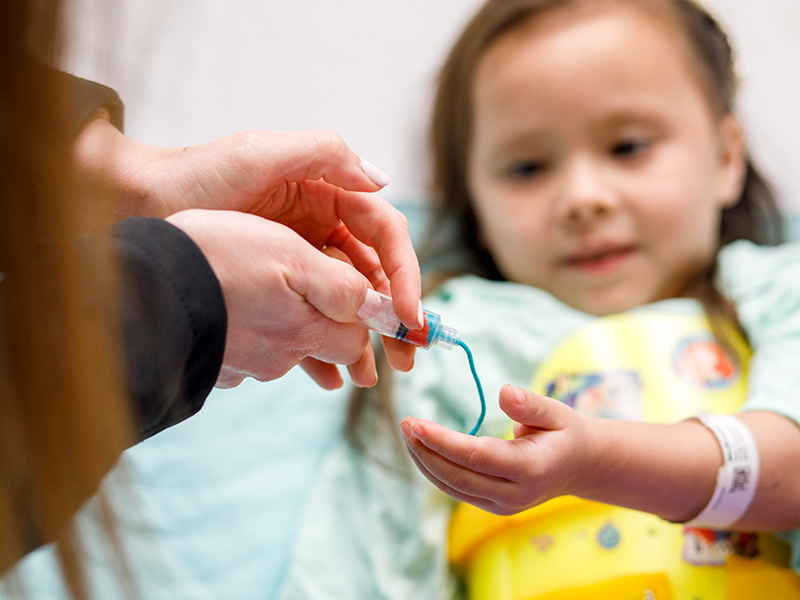Our Patients: ‘Work of childhood’ key to coping, care
Elena McBroom was making noodles, dropping green and purple bits of Play-Doh into a syringe and then pushing the plunger to press out long, thin strings.
While it may seem like child’s play, the 4-year-old from Vicksburg was also strengthening her fine motor skills during her recovery from injuries sustained in an auto accident.
“Play can do so much,” said Cara Williams, a child-life specialist who was working with Elena during her stay in the Children’s of Mississippi Pediatric Intensive Care Unit. “Elena is having fun, but she’s also using her fingers and using a syringe in play. When patients use medical supplies as part of play, it desensitizes them to seeing medical equipment as part of their care and reduces anxiety.”

Elena McBroom of Vicksburg strengthens her motor skills by shaping Play-Doh during her stay at Children’s of Mississippi.
Play is more than having fun. It can be good medicine, according to Williams and other Children’s of Mississippi experts.
“Play is an essential activity of childhood,” said Tiffany Key, a child life specialist, “and play is how children cope, process information and relieve tension. It is how we communicate with our patients and helps us motivate them to do things that will help them heal more quickly.” Whether playing a video game to encourage a patient to get out of bed or using a pillow to help ease post-surgical pain, play is a key part of treating pediatric patients, Key said. “It puts children at ease and lessens the need for pain medication or sedation.”
In the hospital’s surgical areas, patients can drive toy cars to perioperative areas, putting them at ease and leaving any fears behind.
Play can also help patients who have to be patient – those who are receiving medications or blood via infusion and those in dialysis at the University of Mississippi Medical Center’s pediatric artificial kidney unit.
Play helps children recovering from trauma and relearning life skills to regain and strengthen their motor skills, Key said.
Child’s play is serious business when it comes to brain-building, another reason Children’s of Mississippi care team members make sure play is a part of treatment.
“Creativity, social skills, problem-solving, fine motor skills – all of these are developed and practiced during play,” said Dr. Susan Buttross, professor of child development, host of the radio show “Southern Remedy: Relatively Speaking” on Mississippi Public Broadcasting and principal investigator of Mississippi Thrive!, a three-year partnership between UMMC and Mississippi State’s Social Science Research Center.
Playtime is important throughout a child’s life, especially during early childhood, Buttross said.
“In the first few years of life, more than a million neural connections are formed every second,” she said. “The more brain-building opportunities young children have in their first five years, the better.”


